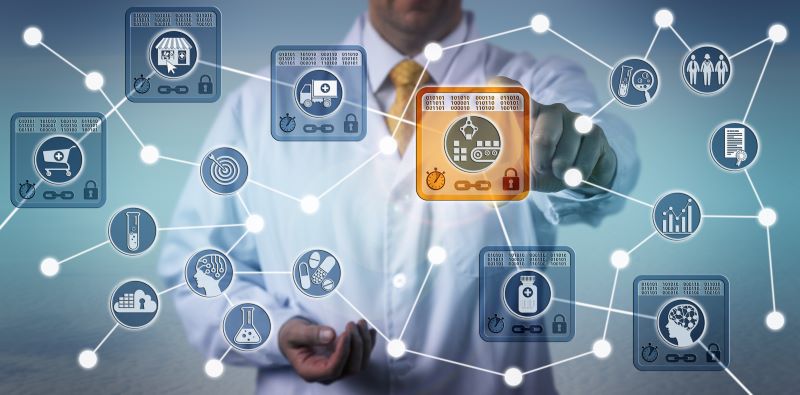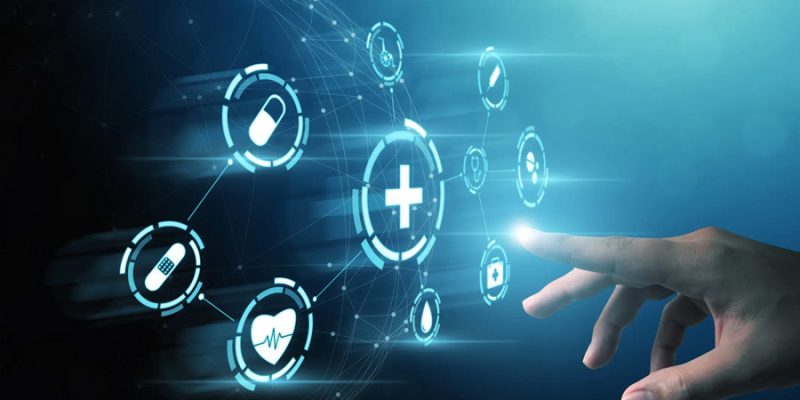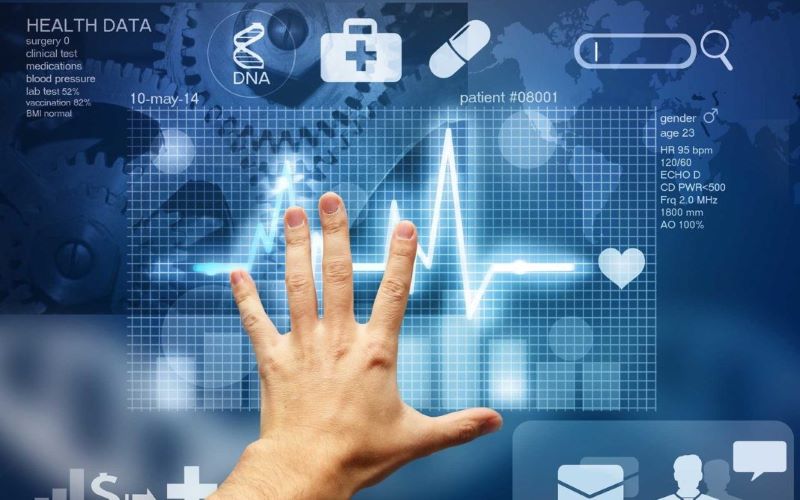Interested in “Blockchain Technology in Healthcare“? This groundbreaking innovation promises to address the industry’s biggest challenges by enhancing transparency, security, and efficiency in managing patient data. Discover how blockchain can revolutionize patient care and medical management, creating a more trustworthy and collaborative healthcare environment!
Blockchain Technology in Healthcare – Increasing Operational Efficiency and Reducing Costs
Blockchain technology in healthcare is a valuable solution that helps increase operational efficiency and reduce costs in the healthcare sector.

Increasing Operational Efficiency
Blockchain technology in healthcare brings significant improvements in operational efficiency. This technology enables the creation of a distributed data system where all patient-related information, from medical records to test results, is stored transparently and immutably.
This allows healthcare facilities to easily access and share information accurately and quickly while minimizing duplication and errors in data processing. When data is synchronized across a distributed network, processes such as testing, diagnosis, and treatment can be carried out more coherently and efficiently, reducing waiting times and improving patient outcomes.
Reducing Costs
Blockchain also plays an essential role in reducing costs for healthcare facilities. Using blockchain technology helps minimize costs associated with managing and maintaining paper records, as all information can be stored and accessed electronically and automatically.
Additionally, blockchain technology and healthcare reduces the need for manual data verification and validation processes, thus lowering labor costs and increasing workflow efficiency. By creating a robust security system, blockchain also helps mitigate the risk of cyberattacks and fraud, protecting financial assets and sensitive information, and saving on legal and insurance-related costs.
Blockchain Technology in Healthcare – Improving Patient Care Quality
Enhancing Information Accuracy and Transparency
Blockchain technology in healthcare significantly improves the accuracy and transparency of patient information. Electronic medical records stored on the blockchain platform cannot be altered or deleted, ensuring that all data about health status, treatment history, and test results are accurately recorded and tamper-proof. This allows doctors and medical staff to easily access complete and accurate information about patients, leading to more accurate treatment decisions tailored to each patient’s specific condition.
Improving Care Processes and Coordinated Treatment
Blockchain enhances patient care processes by creating a synchronized and linked data system across different healthcare facilities. When patient information is stored on a distributed network, doctors, hospitals, and clinics can easily share information and coordinate treatment effectively. This is especially important in multidisciplinary treatment cases or when patients move from one healthcare facility to another. Care processes become smoother, minimizing delays and ensuring that patients receive coordinated and continuous treatment.

Enhancing Security and Privacy
Blockchain provides a high level of security for medical information through the use of encryption and strong security protocols. Storing data on the blockchain helps protect patient information from cyberattacks and fraud, while ensuring that patient privacy is respected. Only authorized individuals can access patient medical information, reducing the risk of sensitive data leaks and increasing patient trust in the healthcare system.
Enhancing Data Tracking and Analysis
Blockchain technology enables real-time collection and storage of patient data, allowing healthcare facilities to continuously monitor patient progress. This data can be analyzed to detect trends and patterns in diseases, supporting the development of new treatment methods and improving care processes. Having accurate and continuous data helps doctors and researchers make decisions based on real-world data, improving the quality of care and treatment outcomes for patients.
Blockchain Technology in Healthcare – Medical Research and Development
Enhancing Data Sharing and Access in Research
Blockchain technology provides a secure and transparent platform for storing and sharing medical research data. In clinical studies and medical trials, accurately storing and managing data is extremely important. Blockchain ensures that research data is recorded and stored immutably, allowing researchers and healthcare organizations to access and share data efficiently. This not only improves the accuracy of research but also promotes collaboration between researchers and global healthcare organizations.
Improving Transparency and Traceability in Research
The use of Blockchain technology in healthcare research improves the transparency and traceability of the entire research process. All changes and data updates are recorded on a distributed ledger, allowing researchers to easily track and verify the research process. This helps minimize the possibility of fraud or data manipulation and ensures that published research results are accurate and reliable. This transparency not only supports the verification and evaluation of research but also contributes to increasing the medical community’s trust in research outcomes.

Accelerating Drug Innovation and Development
Healthcare blockchain technology can accelerate the drug development process by creating an efficient and secure research environment. Pharmaceutical companies and researchers can use blockchain to manage clinical trial data, track drug development processes, and ensure that research results are accurately recorded. The use of blockchain increases the efficiency of the drug development process and reduces risks related to data regulation and analysis. This can shorten the drug development timeline and promote innovation in the pharmaceutical industry.
Supporting Research Funding Management and Distribution
Blockchain technology in healthcare provides an effective solution for managing and distributing research funding. The blockchain system can track the allocation of funds from funding organizations to research projects, ensuring that grants are used for their intended purposes and distributed transparently. This helps minimize the potential for funding misuse and ensures that research funds are used effectively to promote medical advancements.
Blockchain Technology in Healthcare stands as a groundbreaking and comprehensive solution poised to transform the industry. By enhancing data security, improving patient care quality, streamlining research and development processes, and ensuring transparent management of healthcare resources, blockchain technology and healthcare offers a revolutionary approach to addressing some of the sector’s most pressing challenges. Its capacity to integrate, verify, and protect critical information ensures that stakeholders – from healthcare providers to patients—benefit from a more efficient, reliable, and innovative healthcare ecosystem.
As Blockchain Global Network continue to explore and implement blockchain solutions, the potential for improved outcomes and operational efficiency in healthcare becomes increasingly evident, marking a significant step forward in the evolution of medical technology.

RELATED POSTS
Economic Bubble in Crypto – 3 Experiences to deal with it
In the volatile cryptocurrency landscape,...
Exploring the Growth of the Blockchain Technology Market in 2024
The blockchain technology market is...
What is Dapp? The future of U2U decentralized applications
Are you ready to explore...
Nillion Airdrop – Leading the Trend from Testnet to Mainnet
By participating in the Nillion...
Blockchain in Education: Unlocking Cost-Saving Strategies for Students and Institutions
Educational cost reduction in schools...
A Slice of History – The First Recorded Bitcoin Purchase and Its Impact Today
The First Recorded Bitcoin Purchase...
Why did Gama fail Crypto?
“Why did Gama fail crypto?”...
What is a decentralized exchange?
What is a decentralized exchange?...
Toggle Airdrop and Tips for Earning Passive Income
Toggle Airdrop is a great...
The Future of Decentralized Finance: Key Trends for 2025
The decentralized finance (DeFi) landscape...
Solayer Airdrop – Secrets to Maximizing Profits
To maximize profits from the...
Nous Research Secures $50M for Decentralized AI on Solana
Nous Research, a trailblazing startup...
What is ACA Coin? Learn about Acala Network Token
ACA Coin is a vital...
What is Airdrop in the Crypto World? Exploring Its Benefits and Risks
Curious about What is airdrop...
Impact of martial law in South Korea on the financial market
On December 3, 2024, South...
What is Animoca Brands? Learn about the Blockchain empire
In the dynamic world of...